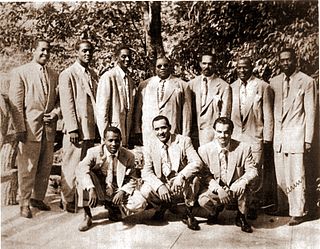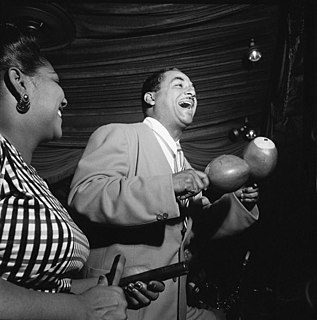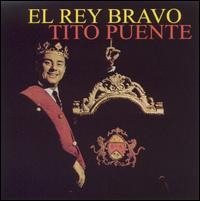
Arsenio Rodríguez was a Cuban musician, composer and bandleader. He played the tres, as well as the tumbadora, and he specialized in son, rumba and other Afro-Cuban music styles. In the 1940s and 1950s Rodríguez established the conjunto format and contributed to the development the son montuno, the basic template of modern-day salsa. He claimed to be the true creator of the mambo and was an important as well as a prolific composer who wrote nearly two hundred songs.

Dámaso Pérez Prado was a Cuban bandleader, pianist, composer and arranger who popularized the mambo in the 1950s. His big band adaptation of the danzón-mambo proved to be a worldwide success with hits such as "Mambo No. 5", earning him the nickname "King of the Mambo". In 1955, Prado and his orchestra topped the charts in the US and UK with a mambo cover of Louiguy's "Cherry Pink ". He frequently made brief appearances in films, primarily of the rumberas genre, and his music was featured in films such as La Dolce Vita.
Héctor Juan Pérez Martínez, better known as Héctor Lavoe, was a Puerto Rican salsa singer. Lavoe is considered to be possibly the best and most important singer and interpreter in the history of salsa music because he helped to establish the popularity of this musical genre in the decades of 1960s, 1970s and 1980s. His personality, style and the qualities of his voice led him to a successful artistic career in the whole field of Latin music and salsa during the 1970s and 1980s. The cleanness and brightness of his voice, coupled with impeccable diction and the ability to sing long and fast phrases with total naturalness, made him one of the favorite singers of the Latin public.

Eddie Palmieri is a Grammy Award-winning pianist, bandleader, musician, and composer of Puerto Rican ancestry. He is the founder of the bands La Perfecta, La Perfecta II, and Harlem River Drive.

Pablo Rodríguez Lozada, better known as Tito Rodríguez, was a Puerto Rican singer and bandleader. He started his career singing under the tutelage of his brother, Johnny Rodríguez. In the 1940s, both moved to New York, where Tito worked as a percussionist in several popular rhumba ensembles, before directing his own group to great success during the 1950s. His most prolific years coincided with the peak of the mambo and cha-cha-cha dance craze. He also recorded boleros, sones, guarachas and pachangas.
A descarga is an improvised jam session consisting of variations on Cuban music themes, primarily son montuno, but also guajira, bolero, guaracha and rumba. The genre is strongly influenced by jazz and it was developed in Havana during the 1950s. Important figures in the emergence of the genre were Cachao, Julio Gutiérrez, Bebo Valdés, Peruchín and Niño Rivera in Cuba, and Tito Puente, Machito and Mario Bauzá in New York. Originally, descargas were promoted by record companies such as Panart, Maype and Gema under the label Cuban jam sessions. From the 1960s, the descarga format was usually adapted by large salsa ensembles, most notably the Fania All-Stars.

Machito was a Latin jazz musician who helped refine Afro-Cuban jazz and create both Cubop and salsa music. He was raised in Havana with the singer Graciela, his foster sister.
Mario Bauzá was a jazz, Latin, and Afro-Cuban jazz musician. He was among the first to introduce Cuban music to the United States by bringing Cuban musical styles to the New York City jazz scene. While Cuban bands had had popular jazz tunes in their repertoire for years, Bauzá's composition "Tangá" was the first piece to blend jazz harmony and arranging technique, with jazz soloists and Afro-Cuban rhythms. It is considered the first true Afro-Cuban jazz or Latin jazz tune.

Dionisio Ramón Emilio Valdés Amaro, better known as Bebo Valdés, was a Cuban pianist, bandleader, composer and arranger. He was a central figure in the golden age of Cuban music, especially due to his big band arrangements and compositions of mambo, chachachá and batanga, a genre he created in 1952. He was the director of the Radio Mil Diez house band and the Tropicana Club orchestra, before forming his own big band, Orquesta Sabor de Cuba, in 1957. However, after the end of the Cuban Revolution, in 1960, Bebo left his family behind and went into exile in Mexico before settling in Sweden, where he remarried. His musical hiatus lasted until 1994, when a collaboration with Paquito D'Rivera brought him back into the music business. By the time of his death in 2013, he had recorded several new albums, earning multiple Grammy Awards. His son Chucho Valdés is also a successful pianist and bandleader.
Oscar Hernández is an American pianist, arranger and producer of Puerto Rican descent.

Israel López Valdés, better known as Cachao, was a Cuban double bassist and composer. Cachao is widely known as the co-creator of the mambo and a master of the descarga. Throughout his career he also performed and recorded in a variety of music styles ranging from classical music to salsa. An exile in the United States since the 1960s, he only achieved international fame following a career revival in the 1990s.

Juan Pablo Pacheco Knipping, known as Johnny Pacheco, was a Dominican-American musician, arranger, composer, bandleader, and record producer. He became one of the leading exponents of a new dance in the late 1950s called the pachanga, a blend of Cuban rhythms and merengue, which propelled him to worldwide notoriety, and had an important role in the evolution of Latin music.

Pedro Juan Rodríguez Ferrer, better known as Pete "El Conde" Rodríguez was a salsa singer born in Barrio Cantera, Ponce, Puerto Rico. His son, also named Pete Rodriguez, is also a salsa and jazz musician. His daughter, Cita Rodriguez, is also an accomplished salsa singer.

The Palladium Ballroom was located at the northeast corner of Broadway and 53rd Street and opened on Thursday, March 15, 1946.

"Oye Como Va" is a 1962 cha-cha-chá by Tito Puente, originally released on El Rey Bravo. The song achieved worldwide popularity in 1970, when it was recorded by Mexican-American rock group Santana for their album Abraxas. This version was released as a single in 1971, reaching number 13 on the Billboard Hot 100, number 11 on the Billboard Easy Listening survey, and number 32 on the R&B chart. The block chord ostinato pattern that repeats throughout the song was most likely borrowed by Puente from Cachao's 1957 mambo "Chanchullo", which was recorded by Puente in 1959.
Alfonso "El Panameno" Joseph was born in the Republic of Panama, and immigrated to New York City at 11 years of age, where he studied music and became one of the forefront bassists of the Cuban bandleader Arsenio Rodríguez. Joseph is a featured guest in a major television production about the era of Afro-Cuban music at The Palladium in New York La Epoca.
Mario Rivera was a Latin jazz saxophonist from the Dominican Republic. Besides saxophone, Rivera played trumpet, flute, piano, vibraphone, congas, and drums.

José Angel Valdes is a Jazz, Latin jazz and classical pianist, organist and bandleader.

Ernesto Antonio "Tito" Puente, Jr. was a Puerto Rican musician, songwriter, record producer and bandleader. The son of Ernest and Felicia Puente, stateside Puerto Ricans residing in New York City's Spanish Harlem, Puente is often credited as "The Musical Pope", "El Rey de los Timbales" and "The King of Latin Music". He is best known for dance-oriented mambo and Latin jazz compositions that endured over a 50-year career. He and his music appear in many films such as The Mambo Kings and Fernando Trueba's Calle 54. He guest-starred on several television shows, including Sesame Street and The Simpsons two-part episode "Who Shot Mr. Burns?". His most famous song is "Oye Como Va".
Tony Pabón was a Puerto Rican-born, New York raised, singer, trumpeter and bandleader influential in the development of boogaloo.











